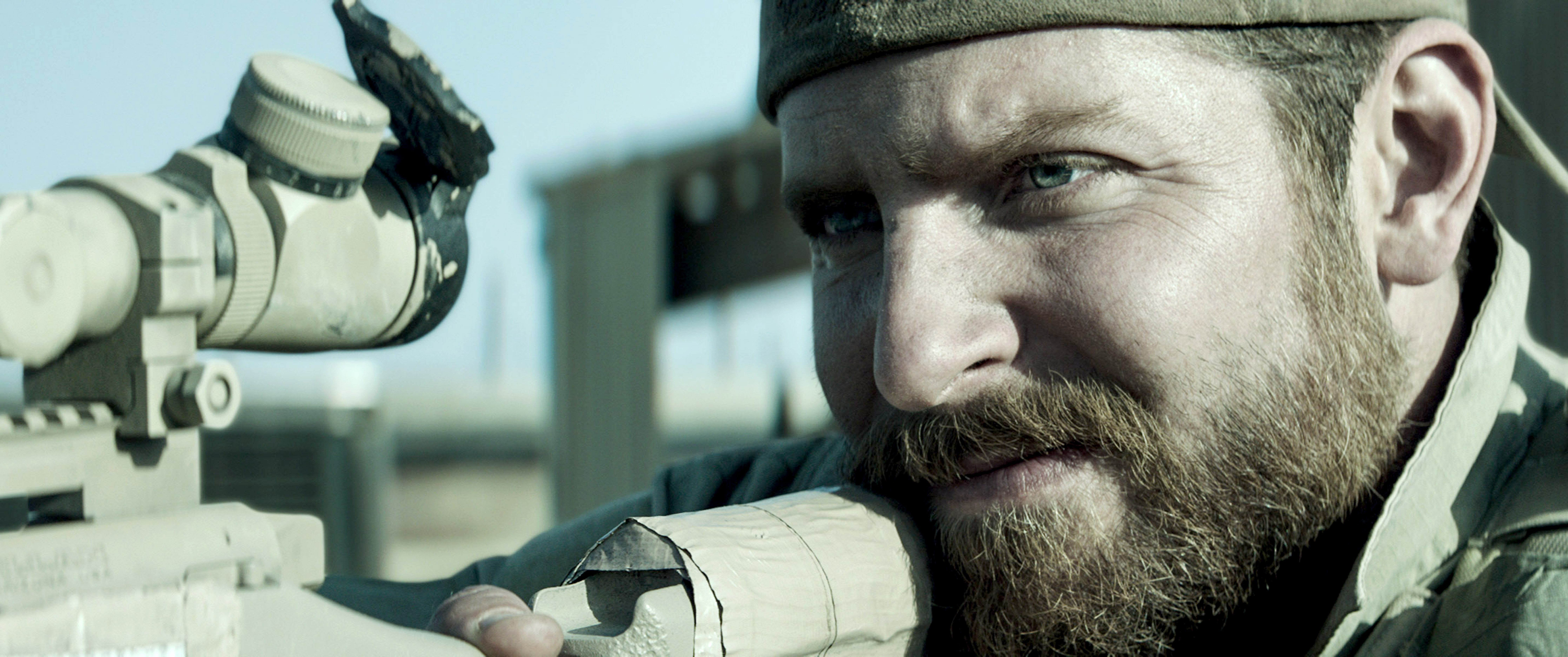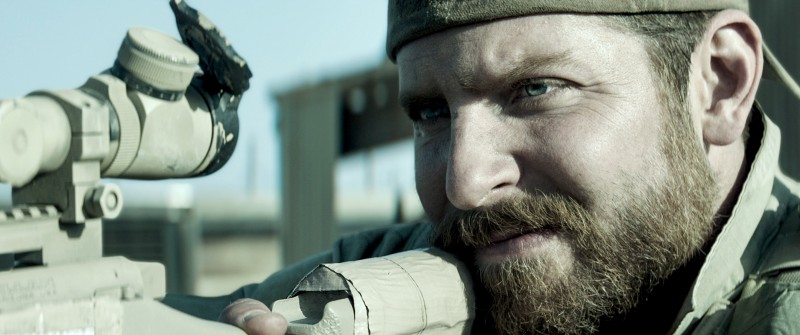Point/Counterpoint: American Sniper

Point: American Sniper is Lazy and Irresponsible

I’ve had the distinct displeasure of coming out on the bad side of many of last year’s most celebrated films. Whether the generic mediocrity of Guardians of the Galaxy or the sloppy storytelling of X-Men: Days of Future Past, I entered that distinct realm of hipster-hood where the most mainstream films drove me past apathy to seething anger.
What angered me most last year were films that claimed to be objective as a means of getting the widest audience possible. Rather than saying anything interesting or, dare I say it, political, these films took the shortest path to the box office and allowed people to go to the movies unchallenged for another year. Theory of Everything fits this bill as does Into the Woods, but the worst offender of 2014 had to be American Sniper.
Looking to critics, politicians and regular moviegoers, American Sniper has received much praise as it has, at the very least, thrilling action sequences and an incredible portrayal of post traumatic stress disorder not often found in war films.
Where the responses to the film differ is in its perceived political stance.
Liberals who liked the film saw it as deeply critical of the war and the Islamophobic patriotism practiced by its hero and thus the American military establishment as a whole.
Many conservatives took a very different message from the film. Commenters on Twitter spoke of wanting “to kill some fucking ragheads” after the film and being glad “to see a movie where the Arabs are portrayed for who they really are – vermin scum intent on destroying us.” These examples are extreme, but they speak to a “support our troops” mentality extends far past the bounds of reason.
I found myself on a different side of the debate. The portrayal of Post Traumatic Stress Disorder is truly remarkable in the film and shows the skill that Clint Eastwood has as a director. However, the politics I saw were closer to the conservatives that loved the film than the liberals.
This is when I realized what the film’s problem is: it staunchly refuses to take a stance on Chris Kyle or the war in Iraq. In fact its telling of history is one where the Iraq war was caused by 9/11 and that joining the military when your country is attacked is a noble thing to do. It ignores the history of Western neo-imperialism that formed much of the conflict now embroiling the Middle-East and tells the story it wants to tell as objectively as it can.
Viewers who went into the film wanting an anti-war film got an anti-war film and viewers who went into it wanting their patriotism and racism justified got that as well.
This is not a case of the message being mistaken — it is a blank slate onto which viewers can project their desires and have their thirsts quenched.
Generally I don’t take the position of blaming a film for the response it evokes from general audiences, but for American Sniper I make an exception.
The American military is not an apolitical body in world affairs. Chris Kyle was not an apolitical man. A great film could have been made that dealt with the nuances of these towering figures and challenged us to delve further into our recent history. Instead we were served milquetoast propaganda to fill our safest desires and nothing offends me more than the bland.
– Mynt Marsellus
Counterpoint: Blame the Culture not the Film

Clint Eastwood’s latest film, American Sniper, chronicling the war-time experiences of famed sniper Chris Kyle has split critics and received some significant backlash. Among many similar headlines, a recent BBC headline reads, “American Sniper film ‘behind rise in anti-Muslim threats.’ ” I find that headline and the sentiment behind it fallacious. This film did not create racism or racists. It did not create the War on Terror or its incomprehensible response. If Chris Kyle’s story and worldview, accurately depicted in this film, galvanize support for intolerance then that signals the need for a switch in focus from the film to the pre-existing condition. Nobody walked into American Sniper a level-headed, tolerant person and walked out calling for the death to “ragheads” everywhere. Anti-Muslim rhetoric is on the individual, not the film.
This is not Delta Force — it’s a true story of a particularly lethal soldier’s experiences on four tours in Iraq. The war was illegitimate and devastating in it’s impact.
The United States invaded without cause, killed without remorse and destabilized the region for the foreseeable future. This film neglects to include any commentary on the war because Eastwood sets out to tell the story of an individual who doesn’t ask questions or study geopolitics. Some soldiers, if Kyle is any indication, were less curious about the legitimacy of the war and more interested in serving their country, following orders and killing the supposed enemy. In Kyle’s mind, he was protecting his country, his family and had God on his side. I am glad this film depicted the brutality that can come of such a mindset.
Ideally, this will be a wake-up call for viewers who challenge the oversimplifications made by Chris Kyle and the U.S. government’s approach to war. There is a large number of Americans who culturally align with Kyle and used the same reasoning he did to get behind the war. Kyle connected dots between terrorist attacks and protecting American freedoms by invading Iraq like millions of others did. Chris Kyle and the war were both anti-Muslim, horribly violent, fueled by murderous dogma and exhibited marks of psychopathology. Unfortunately, it doesn’t make the story any less true. Much of the public supported this war and shared complicity with the media and government for its carnage. Kyle was unique in his ability with a sniper rifle but not in the way he saw the world.
It may make viewers uncomfortable to acknowledge thousands of other God-fearing, freedom-loving soldiers knocked down doors in Fallujah for the same reasons Kyle did and that discomfort is healthy.
There is a moving scene in the film where Kyle, after all he has been through, takes his son out hunting, looking to raise him as he had been raised. Even though affected by the war, Kyle had no remorse and passed his values down to his children who would likely pass it on to theirs. It is optimistic of me, but if viewers can see the commonality of Kyle’s value system and question the pervasive military culture in America, then the film serves a great purpose. Kyle’s book was a bestseller and he was deemed a hero and the film challenges the viewer to see why that is problematic.
Racism, intolerance and Islamophobia were not uncommon in the U.S. (and many other places) before American Sniper and this will still be true long after it’s out of theatres.
This story needed to be told and hopefully stories that matter will continue to be told without being held accountable for exposing the parts of society we try so hard to deny exist.
– Dani Saad

